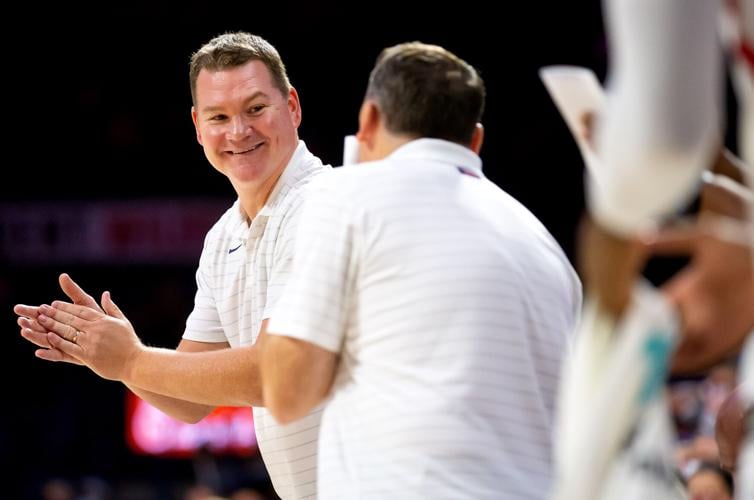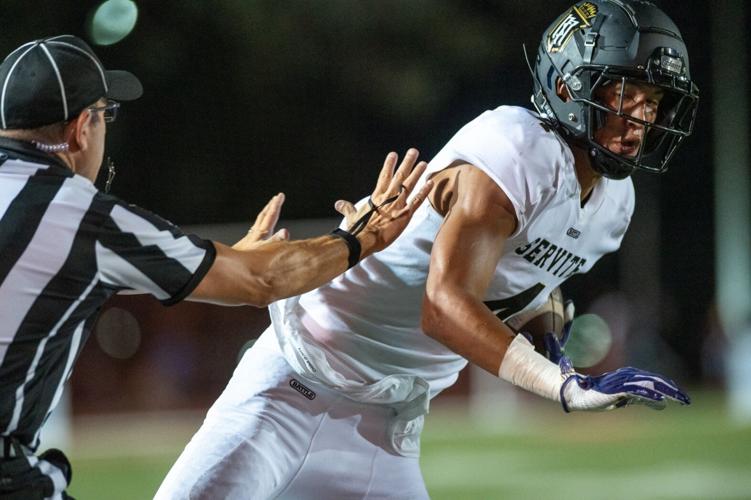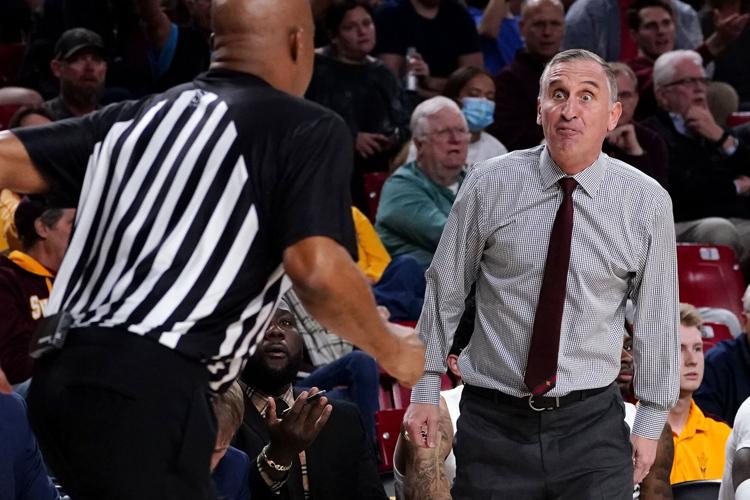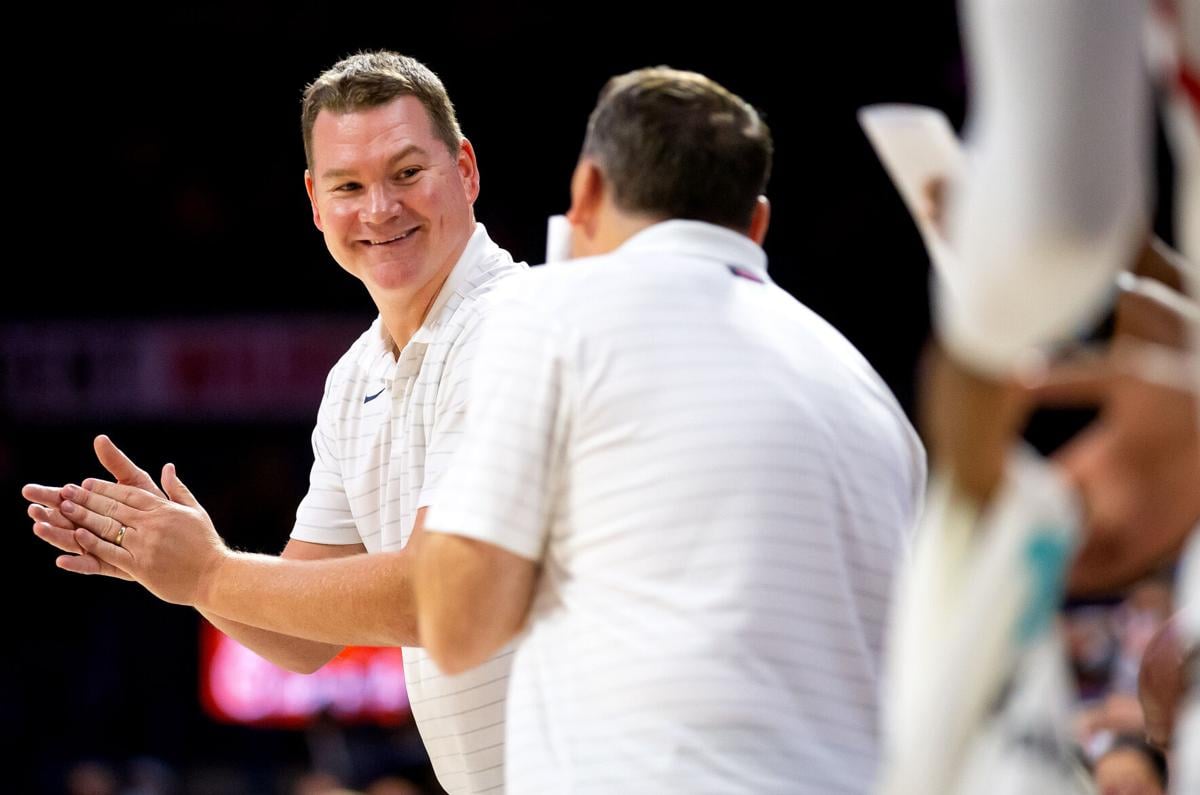Cycles of success and failure are inevitable in college athletics. Two of the best current examples can be found along Interstate 10 in the Sonoran Desert, where Gila monsters roam and fortunes turn.
One year ago this week, Arizona hired Jedd Fisch to rebuild a woeful football program. The Wildcats were coming off a winless season, a 70-7 loss to Arizona State and the dismissal of Kevin Sumlin after a three-year cratering.
The once-vaunted men’s basketball program wasn’t faring much better. The university was days away from announcing a self-imposed postseason ban that would cover both the Pac-12 and NCAA tournaments — the latest development in a years-long recruiting scandal.
The school’s money-maker programs were nestled together in the gutter.
Now here they are, at the close of 2021, loaded with momentum:
Under first-year coach Tommy Lloyd, the basketball team is a favorite for the conference title, the No. 2 team nationally in the NET rankings and aiming for a lofty perch in the NCAA Tournament.
While Arizona has received no news directly from the NCAA, the recent rulings on infractions cases involving Auburn and NC State suggest the Wildcats could escape debilitating sanctions.
Under first-year coach Jedd Fisch, the football program brushed aside a poor on-field performance to deliver a stunning turnaround on the recruiting trail.
The early-signing period ended last week with four-star receiver Tetairoa McMillan flipping his commitment from Oregon to Arizona. In the process, he became the top-ranked prospect to sign with the Wildcats, ever.
Arizona’s recruiting efforts undoubtedly were aided by the decision to sign McMillan’s teammates, tight end Keyan Burnett and quarterback Noah Fifita.

Arizona landed Servite High School star Tetairoa McMillan to its 2022 recruiting class earlier this month.
The landscape was extremely favorable, as well. USC, Oregon and Washington all changed coaches. UCLA is stingy with scholarship offers, and Arizona State is mired in an NCAA investigation.
But credit the Wildcats for taking advantage of the opportunity. We’re not sure a one-win team has ever signed four four-star prospects, under any circumstances.
Meanwhile, up the road, the near-term outlook has turned bleak.
While Arizona thrives on the court, the Sun Devils are struggling. They just lost at home to San Francisco and are two games under .500 with conference play approaching.
Bobby Hurley’s program has regressed substantially in the past 13 months and is now merely one of the masses on a muddled second tier within the conference.
There is even grumbling about Hurley’s job security.
And while Arizona football surges on the recruiting trail, the Sun Devils are effectively paralyzed by the ongoing NCAA investigation.
Herm Edwards’ program signed just eight players in the early window and must rely heavily on the transfer portal unless resolution comes swiftly from the NCAA. (We’ll pause here for laughter from Tempe … and Tucson.)
Two years ago, Arizona State signed seven prospects from California who carried four-star ratings. The class was hailed as a breakthrough for the Devils, the first wave in a seismic change in power within the Pac-12 South.
Meanwhile, Arizona signed zero players with four-star ratings in the class of 2020.
Again, fast forward:
The Wildcats just landed four four-star prospects from California, while the Sun Devils signed zero.
Also, USC has Lincoln Riley, UCLA is stable and ascendant, and Utah is the established rock of the division.
ASU’s window for next-level success is closing fast.

Meanwhile in Tempe, a slow start has led to questions about ASU men's basketball coach Bobby Hurley's future.
Step back, and the competitive landscape across the Sonoran Desert looks markedly different than it did a year ago.
The Wildcats have overtaken ASU on the court and are once again the state’s dominant program.
ASU still has the edge on the field, but the two programs are following disparate trajectories: The Wildcats have momentum, the Sun Devils are stalled, and the gap is closing.







